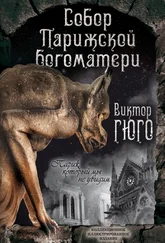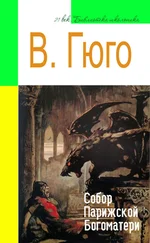| "Begone!" she said to him. |
- Уйди! - сказала она. |
| He left her. |
Он ушел. |
| She was displeased with him. |
Она была им недовольна. |
| He preferred to have her abuse him rather than to have afflicted her. |
Но он предпочел покорно снести ее дурное обращение, лишь бы не огорчить ее. |
| He had kept all the pain to himself. |
Всю скорбь он оставил на свою долю. |
| From that day forth, the gypsy no longer saw him. |
Больше цыганка с ним не виделась. |
| He ceased to come to her cell. |
Он перестал подходить к ее келье. |
| At the most she occasionally caught a glimpse at the summit of the towers, of the bellringer's face turned sadly to her. |
Лишь изредка замечала она на вершине одной из башен печально глядевшего на нее звонаря. |
| But as soon as she perceived him, he disappeared. |
Но едва он ловил на себе ее взгляд, как тут же исчезал. |
| We must admit that she was not much grieved by this voluntary absence on the part of the poor hunchback. |
Надо заметить, что ее не очень огорчало это добровольное исчезновение бедного горбуна. |
| At the bottom of her heart she was grateful to him for it. |
В глубине души она даже была ему благодарна. |
| Moreover, Quasimodo did not deceive himself on this point. |
А Квазимодо это чувствовал. |
| She no longer saw him, but she felt the presence of a good genius about her. |
Она его больше не видела, но присутствие доброго гения замечала. |
| Her provisions were replenished by an invisible hand during her slumbers. |
Пока она спала, невидимая рука доставляла ей свежую пищу. |
| One morning she found a cage of birds on her window. |
Однажды утром она нашла на окне клетку с птицами. |
| There was a piece of sculpture above her window which frightened her. |
Над ее кельей находилось изваяние, которое пугало ее. |
| She had shown this more than once in Quasimodo's presence. |
Она не раз выражала свой страх перед ним в присутствии Квазимодо. |
| One morning, for all these things happened at night, she no longer saw it, it had been broken. |
Как-то утром (все это делалось по ночам) это изображение исчезло. Кто-то его разбил. |
| The person who had climbed up to that carving must have risked his life. |
Тот, кто вскарабкался к нему, рисковал жизнью. |
| Sometimes, in the evening, she heard a voice, concealed beneath the wind screen of the bell tower, singing a sad, strange song, as though to lull her to sleep. |
Иногда по вечерам до нее доносился из-под навеса колокольни голос, напевавший, словно убаюкивая ее, странную печальную песню. |
| The lines were unrhymed, such as a deaf person can make. |
То были стихи без рифм, какие только и мог сложить глухой. |
| Ne regarde pas la figure, Jeune fille, regarde le coeur. Le coeur d'un beau jeune homme est souvent difforme. Il y a des coeurs ou l'amour ne se conserve pas. Jeune fille, le sapin n'est pas beau, N'est pas beau comme le peuplier, Mais il garde son feuillage l'hiver.H?las! a quoi bon dire cela? Ce qui n'est pas beau a tort d'?tre; La beaut? n'aime que la beaut?, Avril tourne le dos a Janvier.La beaut? est parfaite, La beaut? peut tout, La beaut? est la seule chose qui n'existe p?s a demi. Le corbeau ne vole que le jour,Le hibou ne vole que la nuit, Le cygne vole la nuit et le jour. |
Не гляди на лицо, девушка, А заглядывай в сердце Сердце прекрасного юноши часто бывает уродливо Нет сердца, где любовь не живет Девушка! Сосна не красива, Не так хороша, как тополь Но сосна и зимой зеленеет Увы! Зачем тебе петь про это? То, что уродливо, пусть погибает; Красота к красоте лишь влечется, И апрель не глядит на январь. Красота совершенна, Красота всемогуща, Полной жизнью живет одна красота. Ворон только днем летает, Летают ночью лишь совы, Лебедь летает и днем и ночью. |
| One morning, on awaking, she saw on her window two vases filled with flowers. |
Однажды утром, проснувшись, она нашла у себя на окне два сосуда с цветами. |
| One was a very beautiful and very brilliant but cracked vase of glass. |
Один из них представлял собой красивую хрустальную вазу, но с трещиной. |
| It had allowed the water with which it had been filled to escape, and the flowers which it contained were withered. |
Налитая в вазу вода вытекла, и цветы увяли. |
| The other was an earthenware pot, coarse and common, but which had preserved all its water, and its flowers remained fresh and crimson. |
В другом, глиняном грубом горшке, полном воды, цветы были свежи и ярки. |
| I know not whether it was done intentionally, but La Esmeralda took the faded nosegay and wore it all day long upon her breast. |
Не знаю, умышленно ли, но только Эсмеральда взяла увядший букет и весь день носила его на груди. |
| That day she did not hear the voice singing in the tower. |
В этот день голос на башне не пел. |
| She troubled herself very little about it. |
Это ее не встревожило. |
| She passed her days in caressing Djali, in watching the door of the Gondelaurier house, in talking to herself about Phoebus, and in crumbling up her bread for the swallows. |
Она ласкала Джали, следила за подъездом дома Гонделорье, тихонько разговаривала сама с собой о Фебе и крошила ласточкам хлеб. |
| She had entirely ceased to see or hear Quasimodo. |
Она перестала видеть и слышать Квазимодо. |
| The poor bellringer seemed to have disappeared from the church. |
Казалось, бедняга звонарь исчез из собора. |
| One night, nevertheless, when she was not asleep, but was thinking of her handsome captain, she heard something breathing near her cell. |
Но однажды ночью, когда она не спала и мечтала о красавце-капитане, она услышала чей-то вздох около своей кельи. |
| She rose in alarm, and saw by the light of the moon, a shapeless mass lying across her door on the outside. |
Испугавшись, она встала и при свете луны увидела бесформенную массу, лежавшую поперек ее двери. |
| It was Quasimodo asleep there upon the stones. |
То был Квазимодо, спавший на голом камне. |
| CHAPTER V. THE KEY TO THE RED DOOR. |
V. Ключ от Красных врат |

![Виктор Гюго - Собор Парижской Богоматери [Notre-Dame de Paris]](/books/30985/viktor-gyugo-sobor-parizhskoj-bogomateri-notre-thumb.webp)
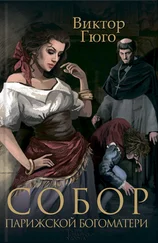
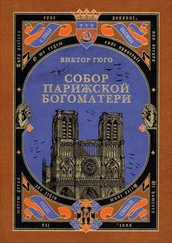
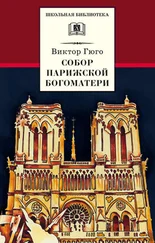
![Виктор Гюго - Собор Парижской Богоматери. Париж [сборник]](/books/398980/viktor-gyugo-sobor-parizhskoj-bogomateri-parizh-sbo-thumb.webp)


